| Report Type | Full |
| Peak(s) |
Capitol Peak - 14,138 feet |
| Date Posted | 05/28/2021 |
| Date Climbed | 09/24/2020 |
| Author | PikaSteve |
| 14ers 401 Final Exam |
|---|
|
14ers 401 Final Exam After 40 years since climbing my first fourteener, 2020 saw my first class 4 summits. With my retirement, my family’s patience and mother nature’s help, I had both the time and the good weather to be able to climb up class 4 routes on Pyramid Peak, Little Bear Peak and North Maroon Peak in addition to class 3 routes on Mt Wilson and Maroon Peak. The summer had turned into a self-taught 14ers 401 class, with 14ers.com as my primary textbook. With continuing good weather in late September, I decided that I was ready for a final exam on Capitol Peak. 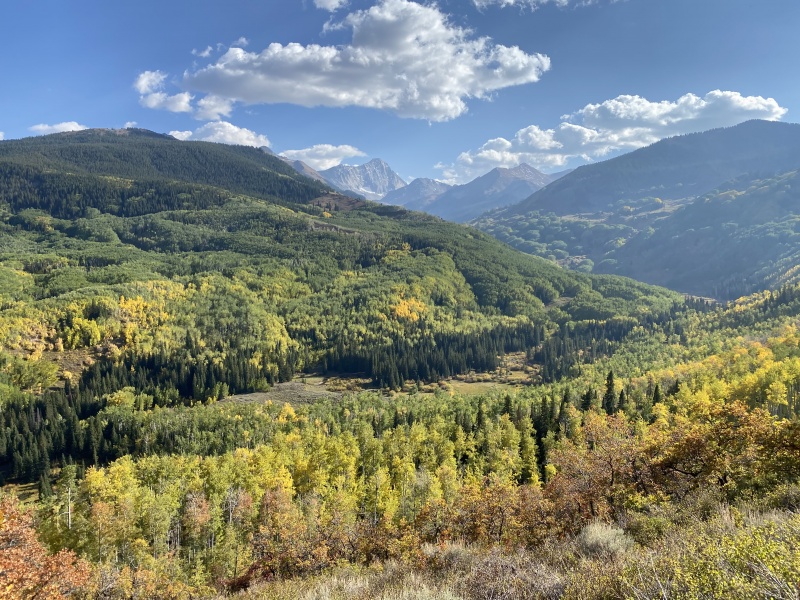
Capitol Creek: September 23, 2020 I left Denver just after lunch. My plan was to drive to the trailhead and backpack in five miles the first day before summitting and hiking out the second day. I finished closing up my backpack, turned on my InReach so my wife could track my progress, and paused at the trailhead signs. Like other exams, this one started with many instructions, some real rules (no campfires; you must have a bear canister; instead of a number 2 pencil, you should have a number 2 wag bag), some legal disclaimers that should be obvious if you took the prerequisite classes or did a small amount of studying (“loose rock causes unstable footing”; “route deviation may result in death”) and some advertising that can be ignored (“hiring a guide recommended for all climbs in the Elk Mountain Range”). 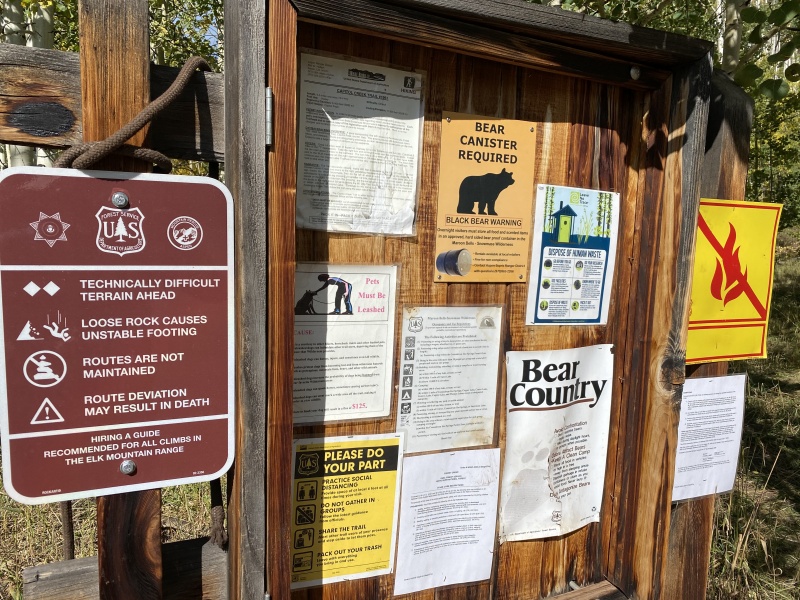
At 4:30pm, I was on the trail hiking and remembering my key personal instruction: “it’s OK to turn around”. I hoped that wouldn’t be necessary—the weather forecast was perfect; my fitness was good in Denver and at altitude; I had good experience with backpacking and Class 3 and 4 climbing; I had researched the route from many sources and I was well rested, well fed and well hydrated—but until you take a test, there’s really no good way to know for sure what to expect. From the very beginning, the ditch trail alternated between peaceful forest and open meadows with beautiful views of changing colors and Capitol Peak far in the distance. In late September, all cattle had already moved to lower elevations. With gentle grades, and new scenery at every clearing, five miles and 1,500’ of elevation passed by easily. 
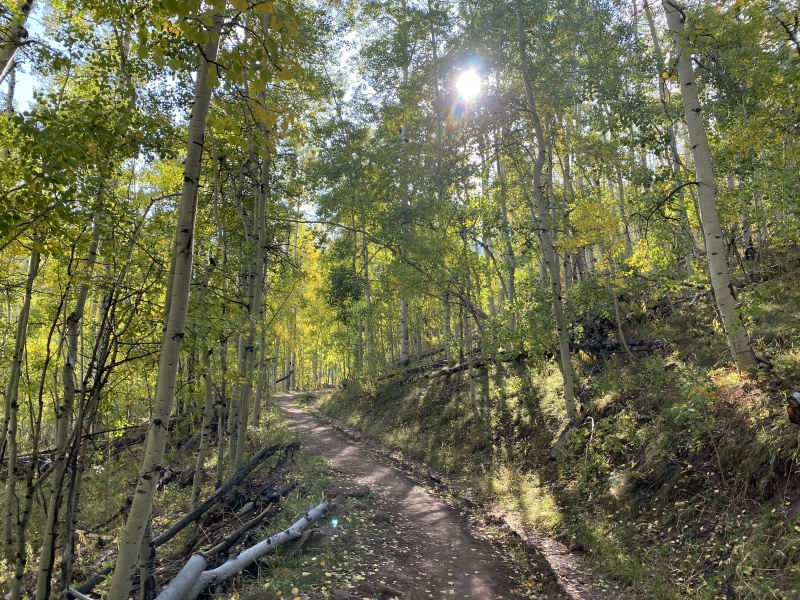
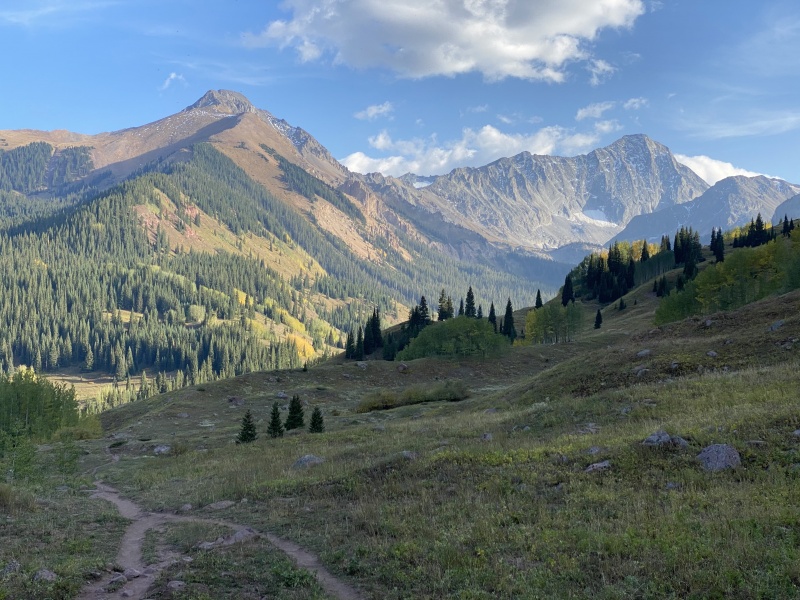
Just before darkness was setting in, at 7:00, I found a scenic flat spot near a clearing to set up camp at about 11,000’ and about a mile before Capitol Lake. 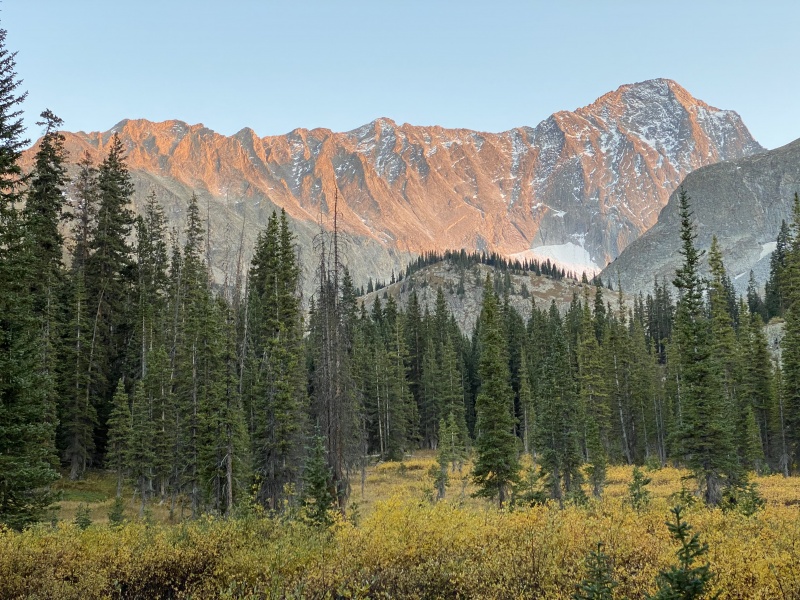
By nine o’clock, I had eaten dinner, filtered water, packed my summit bag, stashed my bear canister and set my alarm for 4:00am. I thought the backpacking section of the test was going well. I was looking forward to the climbing part of the test, especially K2 and the knife edge, although I was a bit uncertain on what challenges to expect after the knife edge. I did my best to sleep rather than dreaming of tomorrow's climb. 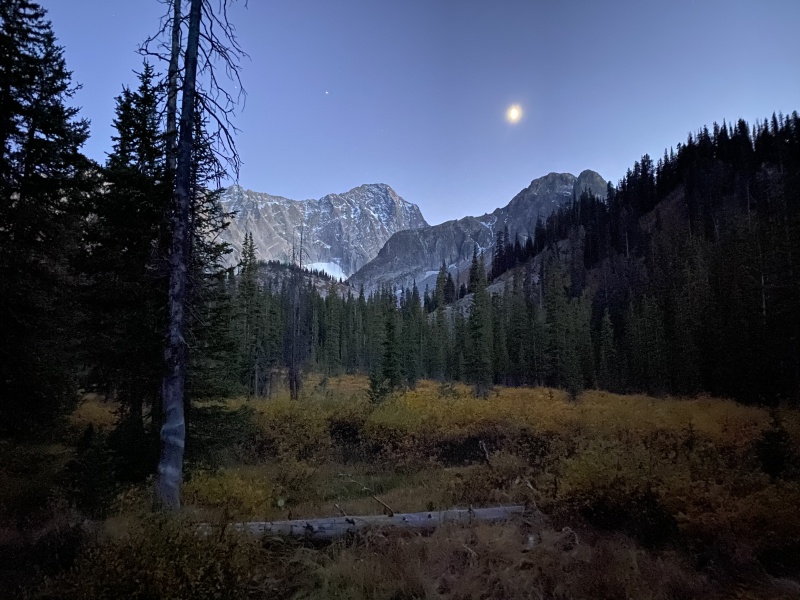
Capitol Peak: September 24, 2020 With a light snack for breakfast, I was on the trail at 4:30. I was glad that I had camped before Capitol Lake, as the first mile of hiking gave me a chance to warm up before starting up the steeper slope to the Daly-Capitol saddle. Hiking by headlamp was extremely quiet and peaceful, except every few minutes I thought I heard a noise making me pause and look backwards to confirm that I was alone. I was making good progress and looking forward to what I thought would be the first challenge at K2. When I reached the saddle and started traversing, the sky was still dark with just a faint glow to the east. Unexpectedly, the trail seemed to just stop in a rocky area with a big headlamp-eating void in front of me. To the left was a steep slope down and to the right were smooth rocks up; my light couldn’t illuminate any ideas on which way was best to proceed. I started to think I wasn’t prepared for this unanticipated part of the test. Rather than proceed into unknown darkness, I decided to backtrack slightly and sit down, eating a proper breakfast and reviewing my map and route notes while waiting for more daylight. Reviewing the 14ers.com route description, I could tell that I was between photos 11 and 12 and experiencing exactly what the photo 11 caption said: “easy trail hiking ends here”. With more daylight, I still couldn’t see exactly how I could get across the gully, so I decided the safest way forward would be to follow the route that I could see, losing about 300 feet of elevation switchbacking down to the bottom of the boulder-covered basin. This was not a pretty solution to this test problem, but at least it allowed me to safely continue taking the exam. Note: after the hike, I found trip reports by DeTour and bdloftin77 that I wished were part of my pre-test studying. 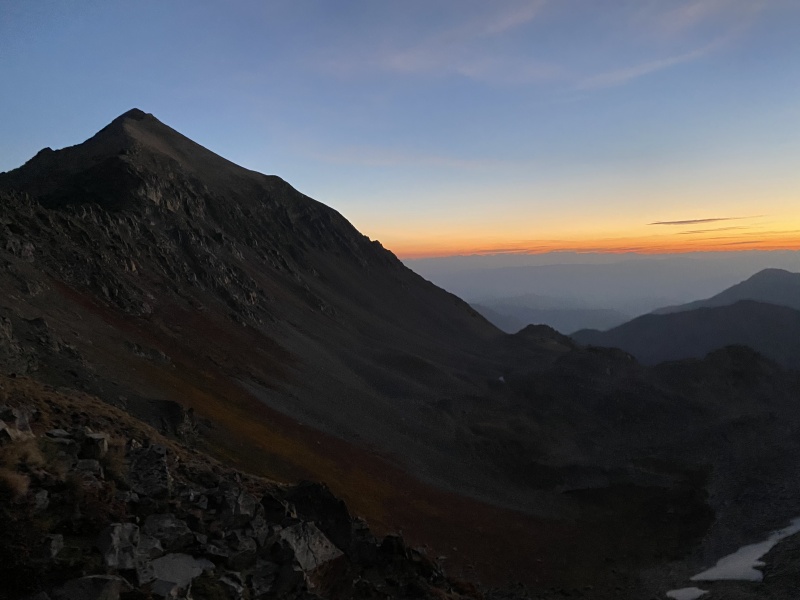
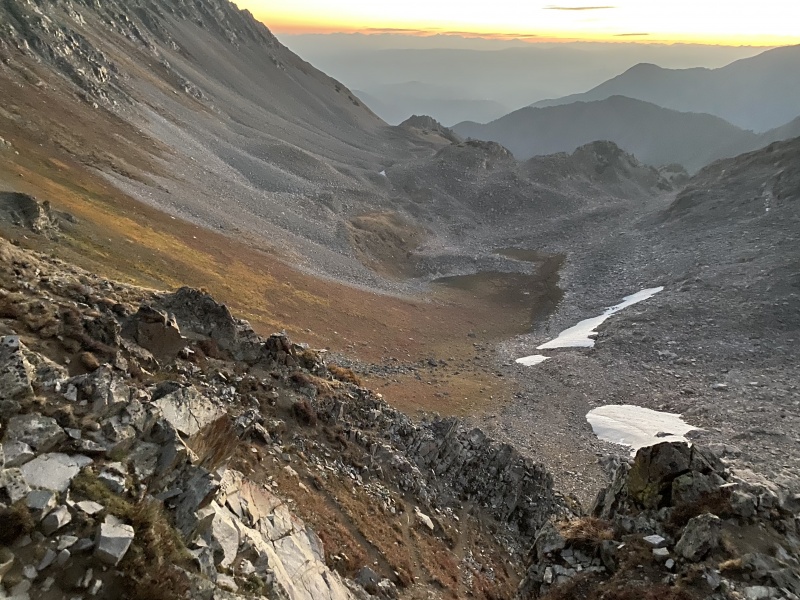
Once past the gully, another underestimated test problem awaited: seemingly endless rock hopping up the basin to K2. If this was a timed test, then I would have failed here. I reached the top of K2 at 9:30, an hour later than planned, but thanks to a perfect forecast, I still wasn't concerned about time. 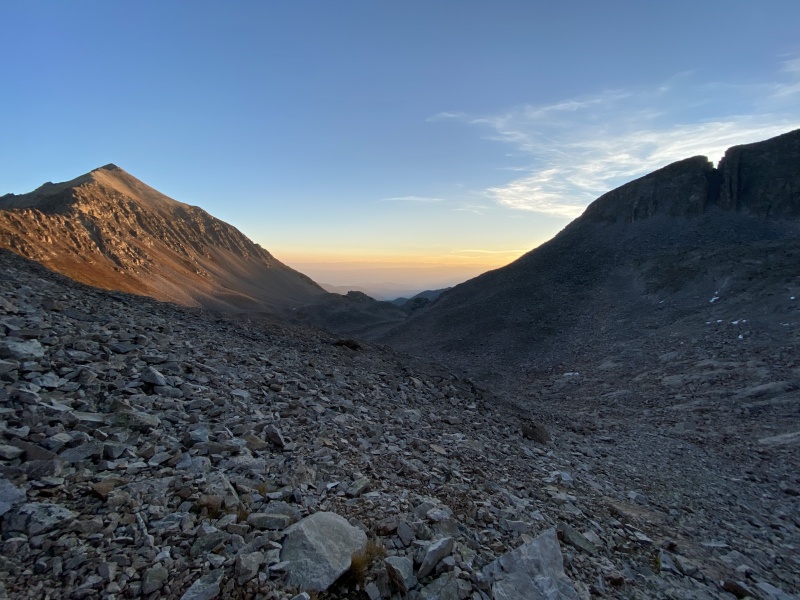
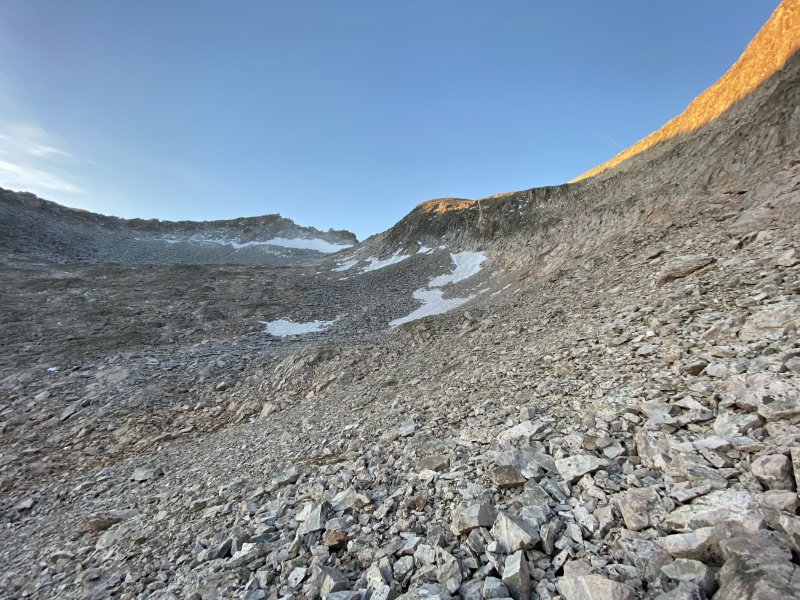
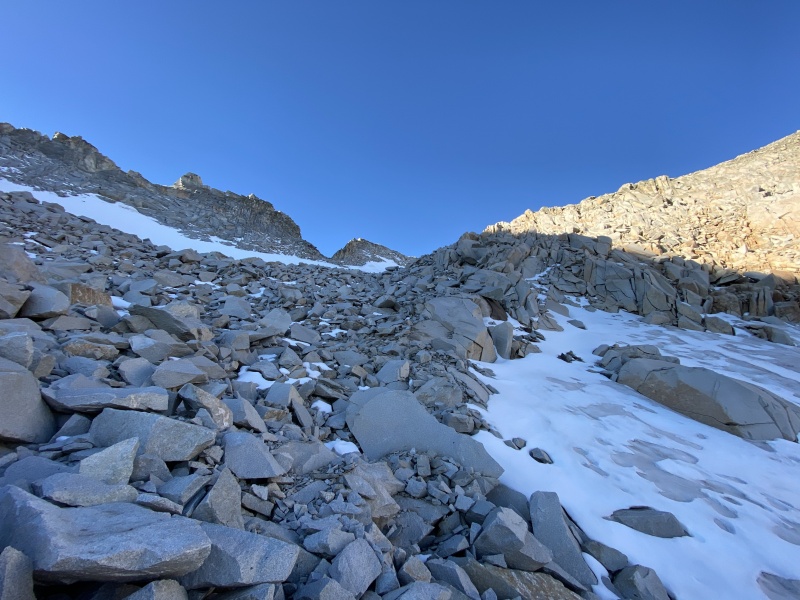
K2 was an easy, short test problem going up. From atop K2, I marveled at the challenge of the remaining exam which was now fully visible. Going down from K2 was a slightly more difficult test problem, but descending was made easier by angling right rather than going straight down. Approach shoes were extremely helpful both directions for holding onto small cracks and creating friction on smooth downward sloping slabs. Because of snow on the north face, the K2 tests could not be bypassed. 

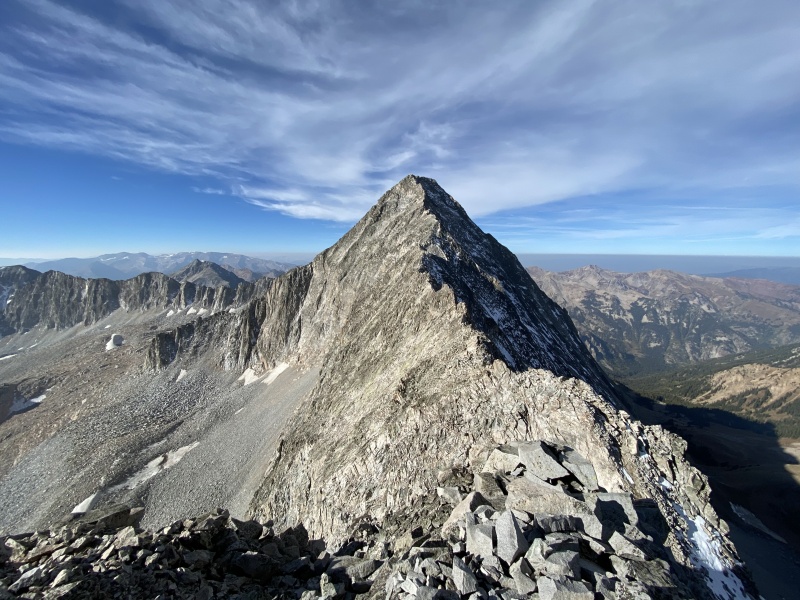
Quickly, it was time for the knife edge. At the sharpest section, logic told me that I was secure in my saddle bronc position with one foot on each side of the ridgeline. Unfortunately, thousand foot drops on each side overruled logic and had my heart racing each time I slowly rose out of the saddle, inched forward and then readjusted my sweaty grip on the rock. Halfway across the sharpest section, I considered turning around, but decided that reversing my saddle would be more scary than completing the ride across. For me, the knife edge was not the most difficult section of 14er climbing from a technical perspective (N Maroon chimney and Little Bear hourglass were harder for me), but it was the most anxiety inducing. I don’t think I earned any style points for my ride, but at least I didn't get bucked off. 

After the knife edge, I continued a slow-moving ascent, following cairns below the northeast ridge and looking to find my way across the upper east face. With my slow pace, I could watch faster parties who had passed me, and, consistent with route photos and reports from SpringsDuke, I was able to identify an upper notch to head towards, conveniently highlighted by two small snow patches. The hardest part of the face crossing was tight-roping across small cracks on a sheer slope just before reaching the snow fields. Once again, sticky approach shoes gave me confidence despite the airy exposure. 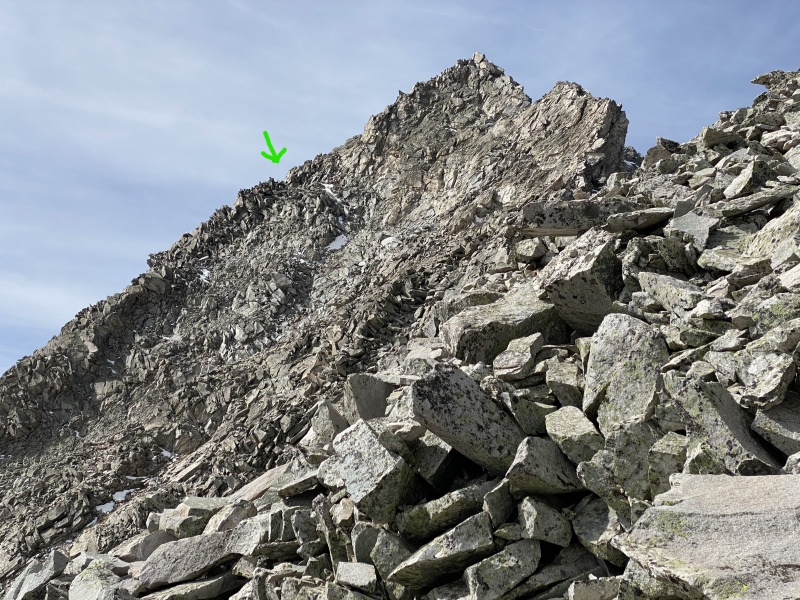
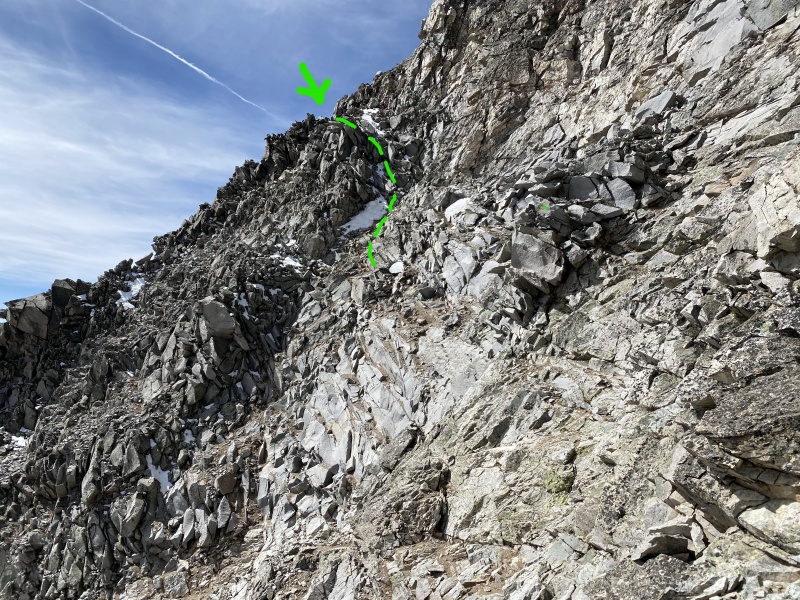
After I reached the targeted notch on the far side of the east face, I could hear other climbers chatting on the summit. The finish line (actually the halfway point) was close in distance, but the steep slope reminded me that this was no time for summit thoughts. I maintained focus while patiently picking my way up the final mix of boulders, dirt and gravel. Topping out just after noon, the climb up took more than two hours longer than expected; I was pleased to have chosen a day with weather that would not impose any time limit on my final exam. At the summit, I finally was able to let my mind relax and enjoy the dramatic views. 
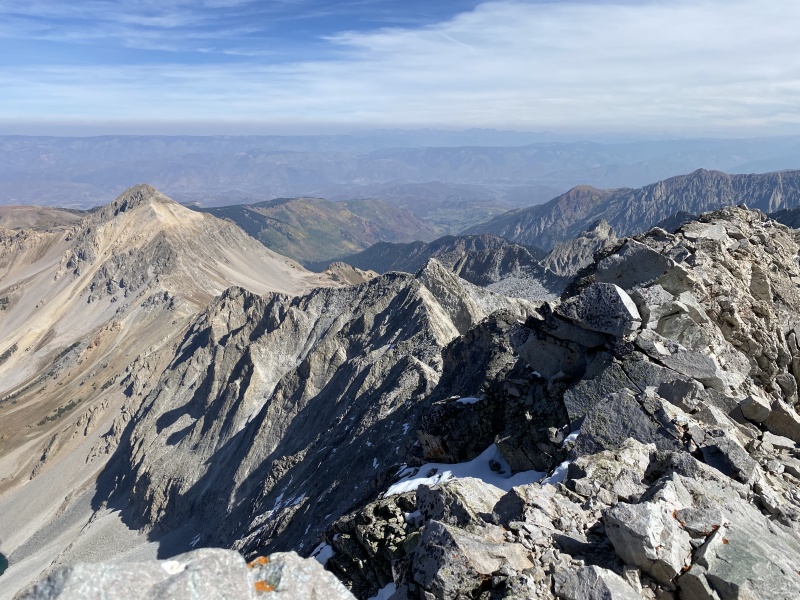
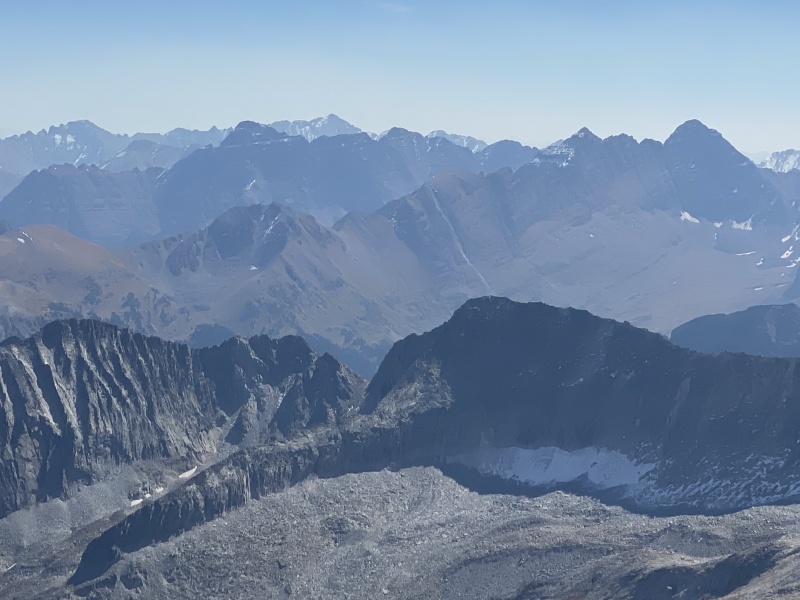
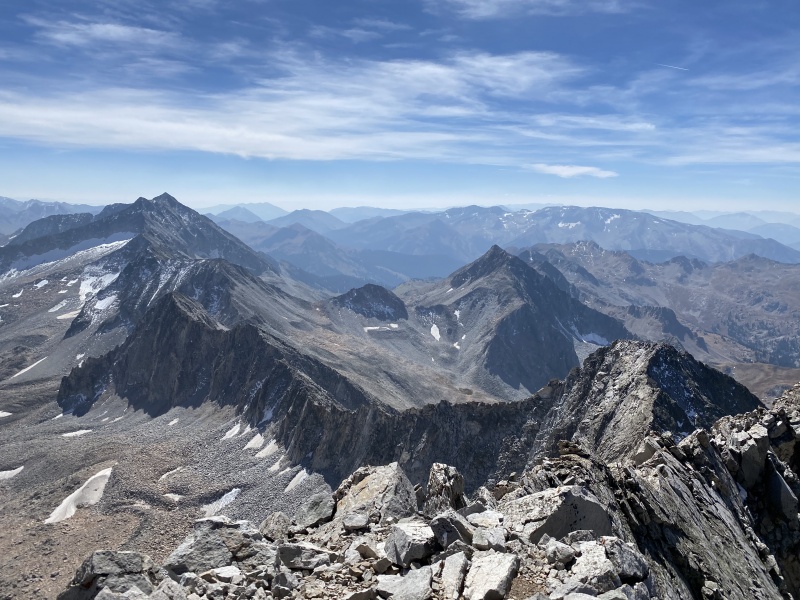
In many ways, the return journey was like reviewing answers at the end of a test. Careful downclimb to notch—check. Tightrope across east face—check. Awkward saddle scoot across the knife edge—check. The knife edge was still difficult and stressful, but much easier and less stressful than the first time, plus no distracting thoughts of turning around. I'm not sure if the holes in my pants came from the first slow trip across the knife edge or the fast return journey. 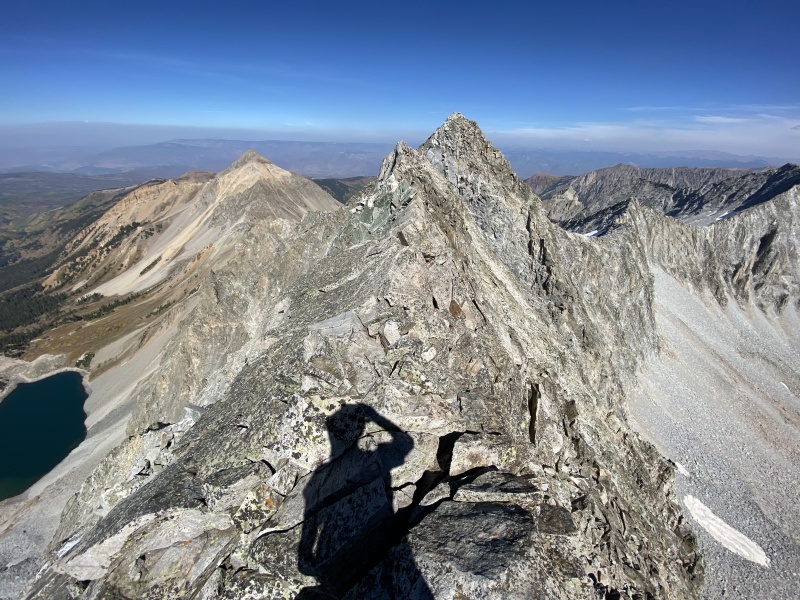
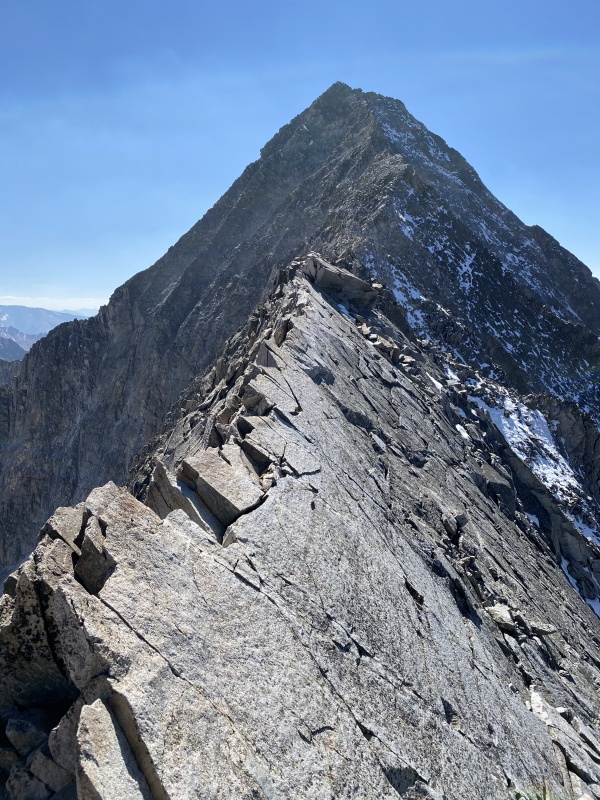
The final test questions to review were rock hopping and gully crossing. I thought I had improved answers, following cairns to stay higher in the basin until it was time to cross the gully. Unfortunately, I still couldn’t find an easily visible place to downclimb ten feet into the gully. Being tired and not wanting to make a mistake so late in the day, I decided to take the longer but safer option of hiking down the grassy slope on the K2side of the gully and climbing up the gravelly switchbacks on the saddle side. Once I reached the Capitol-Daly saddle, all of the difficult test problems had been completed and checked. This left one more difficult problem: telling my wife that I would need to stay one more night at camp before packing out in the morning. Of course she already knew this by watching my tracker progress, but that didn’t make the communication any easier. 
From the saddle, it was back to "easy hiking" and I finally returned to camp as daylight was fading at 7:30. My fifteen hour trip from camp was more than four hours longer than planned, but otherwise, it had been a great day with mountain solitude, stunning scenery, challenging climbing and a proud sense of achievement. I was glad I brought enough food for an extra night contingency. Hot dinner of “Southwest Skillet” and an Advil finished off a long, physically draining, but mentally uplifting day. Capitol Creek: September 25, 2020 Backpacking out along the ditch trail went quickly, except for stopping to take pictures. The leaves were even more photogenic than they were 36 hours earlier. 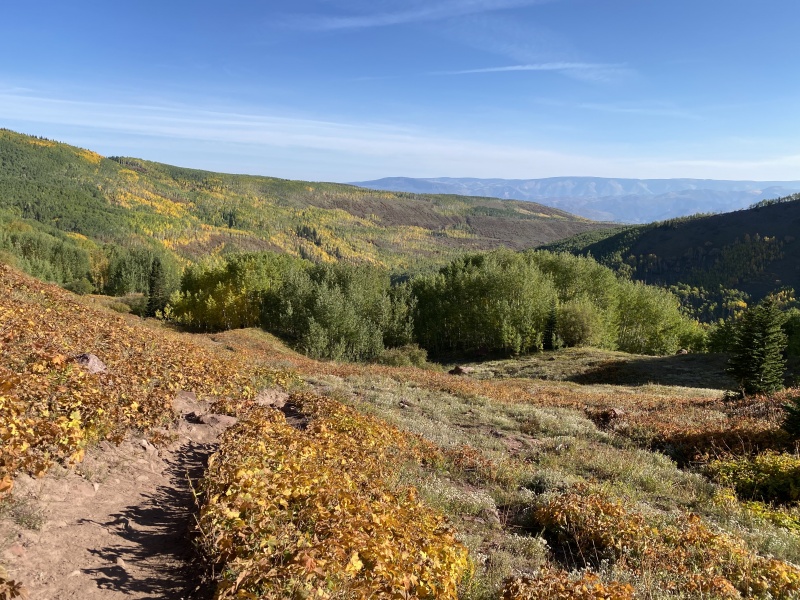
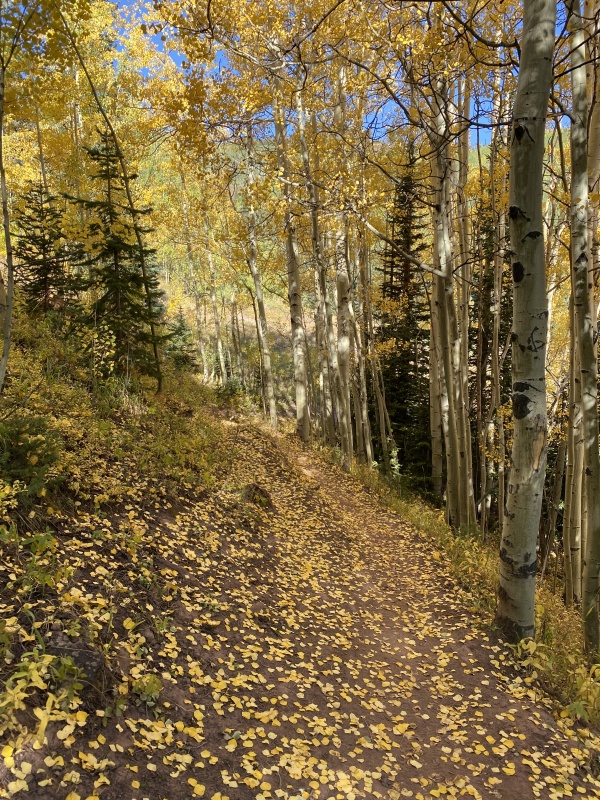
A half mile before returning to the trailhead, I was stopped by Ranger Veronica for my final test questions. She was very polite, but also very imposing with a five foot saw and three foot axe hanging from her large pack. She would not let me proceed until, from a safe social distance, I opened my pack to display my bear canister and answered her question about backcountry hygiene (“wag bag” scored high marks). Having passed this final test, I soon finished hiking back to the trailhead. 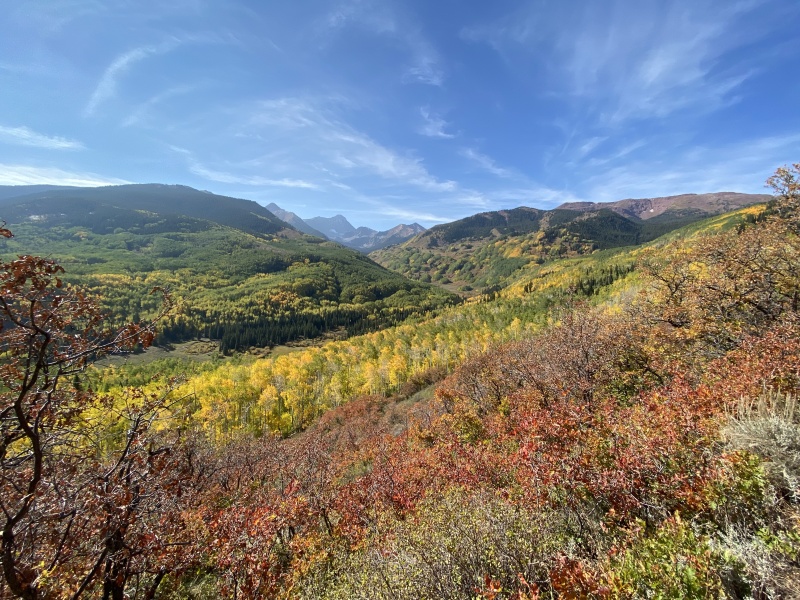
Driving back to Denver, I reflected on what grade I deserved for my 14ers 401 final exam. I gave myself very low marks for speed and style points, but my overall grading rubric emphasized safety, enjoyment, natural beauty and summitting. Plus, I only signed up for a pass/fail grade. I decided that I had earned a “pass” grade and could sign up for a short 14ers 402 class next summer in Chicago Basin to finish the final four peaks on my list of 58. Capitol Peak Resources Helpful trip reports include:
After returning from my trip, I found these three reports that would have been very helpful:
14ers 401 trip reports prior to the final exam:
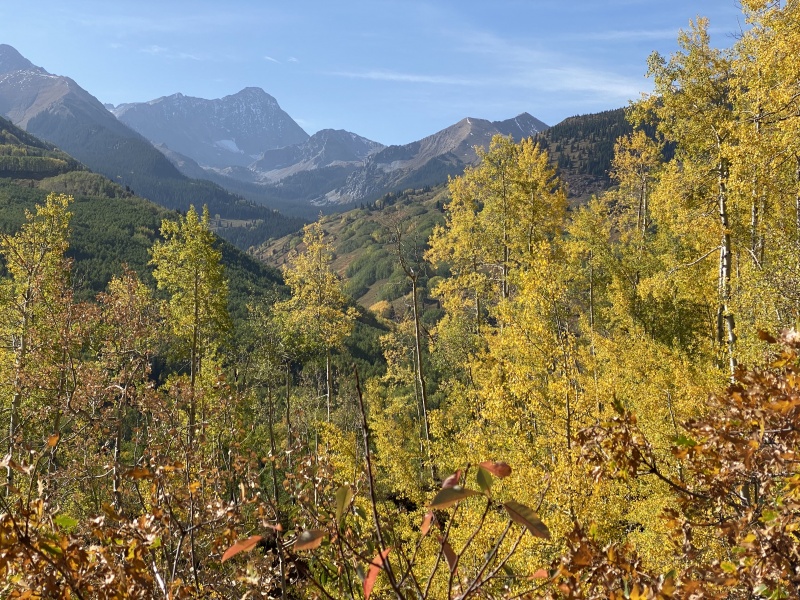
|
| Comments or Questions | |||||||||||||||||||||
|---|---|---|---|---|---|---|---|---|---|---|---|---|---|---|---|---|---|---|---|---|---|
|
Caution: The information contained in this report may not be accurate and should not be the only resource used in preparation for your climb. Failure to have the necessary experience, physical conditioning, supplies or equipment can result in injury or death. 14ers.com and the author(s) of this report provide no warranties, either express or implied, that the information provided is accurate or reliable. By using the information provided, you agree to indemnify and hold harmless 14ers.com and the report author(s) with respect to any claims and demands against them, including any attorney fees and expenses. Please read the 14ers.com Safety and Disclaimer pages for more information.
Please respect private property: 14ers.com supports the rights of private landowners to determine how and by whom their land will be used. In Colorado, it is your responsibility to determine if land is private and to obtain the appropriate permission before entering the property.
